November 1st Scots Book of Days – All Hallows Scottish term days, Samhain, Ireland feast day. Hallowmas, and All Saints’ Day.
November 1 All Hallows Scottish term days, Samhain, Ireland feast day. Hallowmas, and All Saints’ Day. (in the Roman Catholic Church officially the Solemnity of All Saints). The word Halloween was first used in the 16th century and represents a Scottish variant of the fuller All Hallows’ Even (‘evening’), that is, the night before All Hallows’ Day.
Novem is Latin for nine. From the time of Julius Caesar, and before, the year started after the VERNAL equinox in March, 21-24. So the 9th month from March was named November. Scotland only started the year on January 1 in 1600, the English in 1752.
1326 Invasion of England (1326) Isabella of France the She-wolf of France, was Queen consort, sets up at Hereford and pursues Edward II King of England (descendant of Malcolm and Duncan King of Scots).
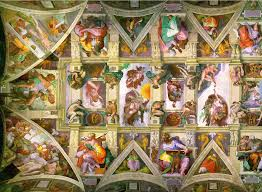 1512 – The ceiling of the Sistine Chapel, painted by Michelangelo, is exhibited to the public for the first time. Italian renaissance will attract John Ruthven, Earl of Gowrie to study at the University of Padua with Galileo, between 1595 to 1599. Italian art and culture (violins and music) will influence Scotland. Sistine Ceiling.
1512 – The ceiling of the Sistine Chapel, painted by Michelangelo, is exhibited to the public for the first time. Italian renaissance will attract John Ruthven, Earl of Gowrie to study at the University of Padua with Galileo, between 1595 to 1599. Italian art and culture (violins and music) will influence Scotland. Sistine Ceiling.
1520 – The Strait of Magellan is discovered, the passage immediately south of mainland South America, connecting the Pacific and the Atlantic Oceans, is first navigated by Ferdinand Magellan during the first global circumnavigation voyage. The Scots will attempt the Darien colony 180 years later to obtain a shorter route across the Isthmus of Panama. (The Isthmus of Darien (later Panama) was unsettled because it was infected with Yellow Fever, which killed off the settlers. Prevention and cure had to wait two centuries until Pasteur’s discovery of the microbial theory of disease, in the 1850’s, and Col. Walter Reed’s clinical trial to demonstrate yellow fever’s transfer to humans by mosquitoes (the vector), in 1900. Defeat Mosquitoes, by Draining all out door water containers, and defeat the Yellow Jack.
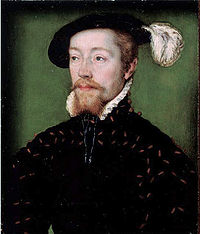 1542 James V King, (reign 9 September 1513 age 17 months – 14 December 1542), ‘obtained success, to his unutterable satisfaction, and prepared for more decisive hostility. James assembled the array of his kingdom, and marched from Edinburgh as far as Fala, [TG28-48] but the English recrossed the border back into England and the nobles would not follow.’ Note James is going to be dead within 6 weeks (December 8, 1542). Portrait of James V, c. 1536, by Corneille de Lyon.
1542 James V King, (reign 9 September 1513 age 17 months – 14 December 1542), ‘obtained success, to his unutterable satisfaction, and prepared for more decisive hostility. James assembled the array of his kingdom, and marched from Edinburgh as far as Fala, [TG28-48] but the English recrossed the border back into England and the nobles would not follow.’ Note James is going to be dead within 6 weeks (December 8, 1542). Portrait of James V, c. 1536, by Corneille de Lyon.
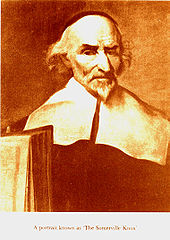 1551 John Knox condemned the coup d’état in a sermon on All Saints Day. Two weeks previous, 16 October 1551, John Dudley, 1st Duke of Northumberland overthrew Edward Seymour to become the new regent of the king of England. When Dudley visited Newcastle and listened to Knox’s preaching in June 1552, Dudley had mixed feelings about the fire-brand preacher, but Dudley saw Knox as a potential asset. Knox was asked to come to London to preach before the Court. In his first sermon, Knox advocated a change for the second edition of the Book of Common Prayer. The liturgy required worshippers to kneel during communion. Knox and the other chaplains considered this to be idolatry. It triggered a debate where Thomas Cranmer was called upon to defend the practice. The end result was a compromise in which the famous Black Rubric, which declared that no adoration is intended while kneeling, was included in the second edition.
1551 John Knox condemned the coup d’état in a sermon on All Saints Day. Two weeks previous, 16 October 1551, John Dudley, 1st Duke of Northumberland overthrew Edward Seymour to become the new regent of the king of England. When Dudley visited Newcastle and listened to Knox’s preaching in June 1552, Dudley had mixed feelings about the fire-brand preacher, but Dudley saw Knox as a potential asset. Knox was asked to come to London to preach before the Court. In his first sermon, Knox advocated a change for the second edition of the Book of Common Prayer. The liturgy required worshippers to kneel during communion. Knox and the other chaplains considered this to be idolatry. It triggered a debate where Thomas Cranmer was called upon to defend the practice. The end result was a compromise in which the famous Black Rubric, which declared that no adoration is intended while kneeling, was included in the second edition.
Portrait titled “The Somerville Knox”
1555 – the congregation in Geneva had elected Knox as their minister.
1600 After the Gowrie conspiracy (August 1600) the Countess of Gowrie (Dorothea Ruthven (nee Stewart) (mother of the assassinated young Earl) penned a petition on 1 Nov. 1600, in which she wrote: ‘I am so overcharged with the payment of annual rents for his majesty’s debts [48,063 L., ] contracted during the time of my husband’s being in office of treasurer, which sums of money were taken on my compact fee lands, that scarce am I able to entertain my own estate’ (Hist. MSS. Comm. 9th Rep. pt. ii. p. 196). [In other words, the King owed a King’s ransom to the Dowager Countess of Gowrie, and the King would not pay. This was a motive for murdering the young Earl.] Dorothea’s father was the Master of Methven, killed at the Battle of Pinkie, and son of Mararet Stewart (nee Tudor) Dowager Queen of Scotland. The Ruthven’s were as close relatives to Elizabeth, Queen of England, as James 6th Stewart.
1604 – William Shakespeare’s tragedy Othello is presented for the first time, at Whitehall Palace in London. He will write about Scots history in Macbeth.
1611 – William Shakespeare’s romantic comedy The Tempest is presented for the first time, at Whitehall Palace in London.
1642 Battle of Aylesbury.
1644 Sir John Meldrum (died 1645) recaptured Liverpool (Cal. State Papers, Dom. 1644, pp. 173, 440, 442; Robinson, Discourse of the War in Lancashire, pp. 54–9; Ormerod, Lancashire Civil War Tracts, p. 204; Hist. MSS. Comm. 10th Rep. pt. iv. pp. 73, 95). In May 1644 Meldrum was detached with two regiments to secure Manchester, to take command of the Lancashire forces against Prince Rupert. Meldrum held Manchester, but could not prevent the loss of Bolton and Liverpool. After the battle of Marston Moor, however, Meldrum defeated Rupert’s fugitive horse at Ormskirk on 20 Aug., Dictionary of National Biography vol. 37.
1671 – Robert Miller (1st ) of Ochiltree married, as his first wife, (1st ) Margaret, daughter of Gilbert Kennedy of Girvanmains, but had no children. [Previously] After less than a year [1662] at Ochiltree, like his brother Andrew at Dailly, Robert was deprived of his charge for failure to recognize the episcopacy. Robert and his brother Henry left Scotland and spent some seven years in Holland and France. Robert studied medicine, and obtained his M.D. in 1668. Henry studied Oriental languages. When they returned,
Robert continued his ministry but Henry went to London where he first worked [YYMA 72 HENRY MILLER] with a bookseller named Poole and later acted as tutor on the Grand Tour to various young gentlemen, visiting the Continent ten times before his death at London in 1718.
In 1669, the Privy Council issued a number of licenses ‘in accordance with the late Indulgence for certain ministers to preach; they included ‘Mr. Robert Miller, late minister at Ochiltrie, at the same kirk.’
But just as ousted ministers were forbidden to reside within twenty miles of their auld parishes, indulged ministers were confined to them; two years later, the Privy Council minutes that it has considered the petition of four ministers, including Robert Miller of Ochiltree, ‘supplicating to have some liberty, notwithstanding of their confinement, to come to Edinburgh and other places about some necessar affaires and to use meanes for their health’ and allows them free movement until 1 November [1671].
1688 – William 3rd of Orange sets a second time from Hellevoetsluis in the Netherlands to liberate England, Scotland and Ireland from the tyrannical King James II of England (7th of Scotland) during the Glorious Revolution.
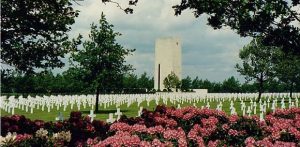 American military cemetery in Netherlands, with 8,301 souls, of whom an estimated 40% have Scots ancestry. 230 years and 256 years later Netherlands in turn is liberated. The Dutch speak Dutch instead of German because of the American Soldier.
American military cemetery in Netherlands, with 8,301 souls, of whom an estimated 40% have Scots ancestry. 230 years and 256 years later Netherlands in turn is liberated. The Dutch speak Dutch instead of German because of the American Soldier.
1700 The imminent death of the childless Charles II of Spain a new conflict over the inheritance of the Spanish Empire (the most important unsolved question of European politics) would soon embroil France and the Grand Alliance in Louis XIV’s final conflict – the War of the Spanish Succession.
1715 Earl of Mar had by the beginning of November received all the reinforcements [TG70-344]
1765 – The British Parliament enacts the Stamp Act on the 13 colonies, supposedly in order to help pay for British military operations in North America. The Colonists, with their own militias, needed no British military operations, as demonstrated by numerous successful operations in defense of the settlements. In fact, the Stamp Act was an effort by English merchant politicians to replace lost revenues suffered by their Indian subcontinent investments. It was not received well by the colonists, and gave them an incentive to unify in opposition.
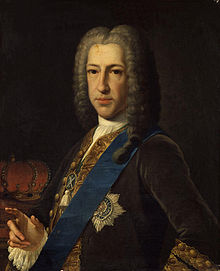 1766 James Francis Edward Stuart, the ‘Old Pretender’, died. James II’s (of England) son. Prince of Wales (James Francis Edward Stuart; “The auld Pretender” or “The auld Chevalier” claimed the English, Scottish and Irish thrones (as James III of England and Ireland and James VIII of Scotland) from the death of his father in 1701, when he was recognized as king of England, Scotland and Ireland by his cousin Louis 14th of France. Following his death in 1766, he was succeeded by his son Charles Edward Stuart in the Jacobite Succession. James Francis Edward Stuart
1766 James Francis Edward Stuart, the ‘Old Pretender’, died. James II’s (of England) son. Prince of Wales (James Francis Edward Stuart; “The auld Pretender” or “The auld Chevalier” claimed the English, Scottish and Irish thrones (as James III of England and Ireland and James VIII of Scotland) from the death of his father in 1701, when he was recognized as king of England, Scotland and Ireland by his cousin Louis 14th of France. Following his death in 1766, he was succeeded by his son Charles Edward Stuart in the Jacobite Succession. James Francis Edward Stuart
1782 Frederick John Robinson, born, (Prime Minister) (PM 1827-28) 1st Viscount Goderich and 1st Earl of Ripon b 1 Nov 1782, London, d 28 Jan 1859, Putney Heath, Surrey. Great Great grand parents . 28 John Campbell, 2nd Earl of Breadalbane (Atholl Scotland), Will pr Feb 1753 b 19 Nov 1662 d 23 Feb 1752, Palace of Holyrood-house m 23 May 1695
29 Henrietta, dau of Sir Edward Villiers, Knight Marshal d 1 Feb 1719/20.
1805 – Napoleon Bonaparte invades Austria during the War of the Third Coalition. France is allied with the United States.
1814 – Congress of Vienna opens to re-draw the European political map after the defeat of France, in the Napoleonic Wars.
1831 Joseph Smith the Prophet, at Hiram, Ohio. (Clans Mack, Mackenzie of Inverness, Hamilton, Huntley, Malcolm King of Scots). Doctrine and Covenants 69. That he may the more easily obtain knowledge—Preaching and expounding, writing, copying, selecting, and obtaining all things. Section 1. Wherefore, I the Lord, knowing the calamity which should come upon the inhabitants of the earth…
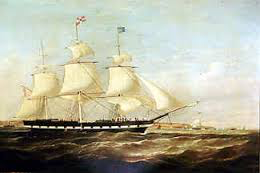 1839 New York and the Gospel of Jesus Christ. Two missionaries left for Britain aboard the packet Tarolinta on 1 November 1839. Samuel Mulliner (b. 1809), five years younger than Alexander Wright (b. 1804), had also moved to Canada from his birthplace in East Lothian. Mulliner had married Catherine Nisbit of Berwickshire and emigrated with the intention to settle in Australia. Diverted to Toronto, the Mulliners heard the gospel message from Parley P. Pratt and joined The Church of Jesus Christ of Latter-day Saints (along with Theodore Turley, a lay preacher in the Methodist church). Called in Springfield, Illinois to accompany the twelve Apostles to Europe. [Ensign Feb. 1987] Packet ship circa mid 19th century.
1839 New York and the Gospel of Jesus Christ. Two missionaries left for Britain aboard the packet Tarolinta on 1 November 1839. Samuel Mulliner (b. 1809), five years younger than Alexander Wright (b. 1804), had also moved to Canada from his birthplace in East Lothian. Mulliner had married Catherine Nisbit of Berwickshire and emigrated with the intention to settle in Australia. Diverted to Toronto, the Mulliners heard the gospel message from Parley P. Pratt and joined The Church of Jesus Christ of Latter-day Saints (along with Theodore Turley, a lay preacher in the Methodist church). Called in Springfield, Illinois to accompany the twelve Apostles to Europe. [Ensign Feb. 1987] Packet ship circa mid 19th century.
1914 – World War I: the first British Royal Navy defeat of the war with Germany, the Battle of Coronel, is fought off of the western coast of Chile, in the Pacific, with the loss of HMS Good Hope and HMS Monmouth.
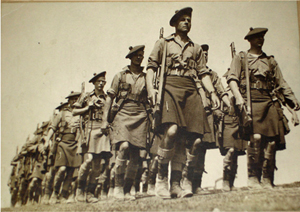 1942 The Battle of El Alamein, Egypt, is usually divided into five phases, consisting of the break-in (23–24 October), the crumbling (24–25 October), the counter (26–28 October), Operation Supercharge (1–2 November) and the breakout (3–7 November). The significance of the Allied victory in northern Egypt was not lost on Britain’s war-time Prime Minister, Winston Churchill. He wrote in 1951: “Before Alamein we never had a victory. After Alamein, we never had a defeat.’’ Analysis of the commission’s data reveals most Scottish soldiers came from Glasgow (5,085), Edinburgh (2,586), and Aberdeenshire (1,756).
1942 The Battle of El Alamein, Egypt, is usually divided into five phases, consisting of the break-in (23–24 October), the crumbling (24–25 October), the counter (26–28 October), Operation Supercharge (1–2 November) and the breakout (3–7 November). The significance of the Allied victory in northern Egypt was not lost on Britain’s war-time Prime Minister, Winston Churchill. He wrote in 1951: “Before Alamein we never had a victory. After Alamein, we never had a defeat.’’ Analysis of the commission’s data reveals most Scottish soldiers came from Glasgow (5,085), Edinburgh (2,586), and Aberdeenshire (1,756).
51st Highland Division.
http://wilderness-ventures-egypt.com/2011/07/alamein-highland-piper-duncan-mcintyre/
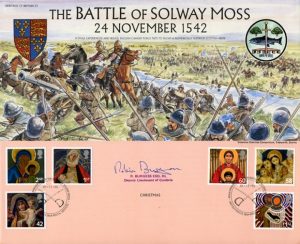 2005 Battle of Solway Moss First Day Cover celebrating the best of Britain released. (Total disaster for the Scots, huge victory for Henry 8th). Bfdc.co.uk
2005 Battle of Solway Moss First Day Cover celebrating the best of Britain released. (Total disaster for the Scots, huge victory for Henry 8th). Bfdc.co.uk
24 November 1542 border clans refuse James support. 8 December James V dies.
 1987 Trump: The Art of the Deal. by Warner Books.
1987 Trump: The Art of the Deal. by Warner Books.
Donald John Trump, Sr. (clans MacQueen, Macaulay, MacLeod, of Aberdeenshire and Outer Hebrides), (born June 14, 1946). His mother was Mary Anne MacLeod, (born May 10, 1912,– died August 7, 2000), who was married in 1936. Mary Anne was born at Tong, Stornoway, on the Isle of Lewis, off th e coast of Scotland, United Kingdom.
2012 Humor. Campbell’s nephew, Ross, came in with a problem. “Ah hae me choice of twa women,” Ross said, “a beautiful, penniless young lassie whom Ah love dearly, ane a rich auld widow woman whom Ah kinnae stand.”
”Follow yae heart; marry the 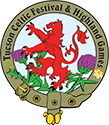 lassie ye love,” Campbell counseled.
“Very well, Uncle Campbell,” said the nephew, “that’s sound advice.”
“By the way,” asked Campbell “where dia the widow live?”
lassie ye love,” Campbell counseled.
“Very well, Uncle Campbell,” said the nephew, “that’s sound advice.”
“By the way,” asked Campbell “where dia the widow live?”
http://www.scotlandvacations.com/JokesPage1.htm
2015 /tucsoncelticfestival.org
Disclaimer: The author of each article published on this web site owns his or her own words. The opinions, beliefs and viewpoints expressed by the various authors and forum participants on this site do not necessarily reflect the opinions, beliefs and viewpoints of Utah Standard News or official policies of the USN and may actually reflect positions that USN actively opposes. No claim in public domain or fair use. © John Choate
Utah Standard News depends on the support of readers like you.
Good Journalism requires time, expertise, passion and money. We know you appreciate the coverage here. Please help us to continue as an alternative news website by becoming a subscriber or making a donation. To learn more about our subscription options or make a donation, click here.
To Advertise on UtahStandardNews.com, please contact us at: ed@utahstandardnews.com.


Comments - No Responses to “November 1st Scots Book of Days – All Hallows Scottish term days, Samhain, Ireland feast day. Hallowmas, and All Saints’ Day.”
Sure is empty down here...